THESE ARTICLES WERE PUBLISHED IN THE CITRUS COUNTY CHRONICLE ON THE DATES UNDERNEATH EACH ONE. IF READING THEM AS THEY APPEARED IN THE NEWSPAPER WOULD BE TOO DIFFICULT THEY APPEAR IN WORD. THEY ARE BACKWARDS CHRONOLOGICAL EXCEPT FOR THE FIRST ARTICLE “WHAT IS THE LEAGUE….”
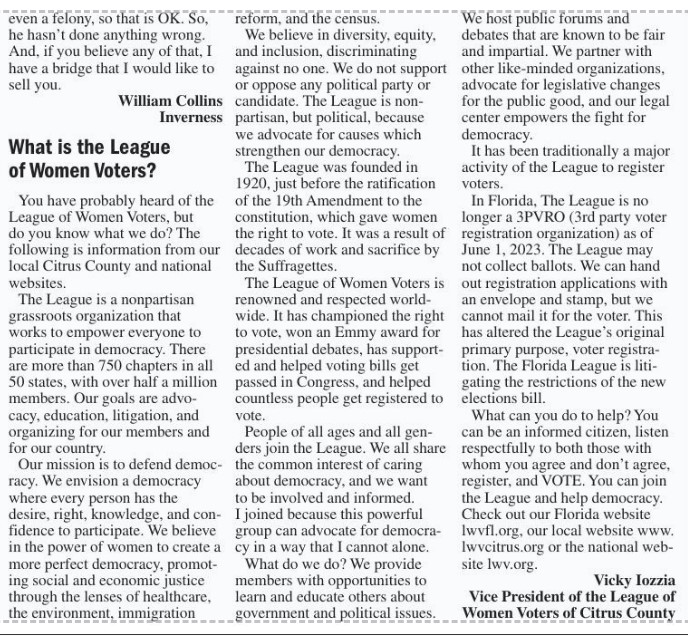
Vicky’s article was published on August 26, 2023. It is also a LWV of Florida powerpoint presentation.
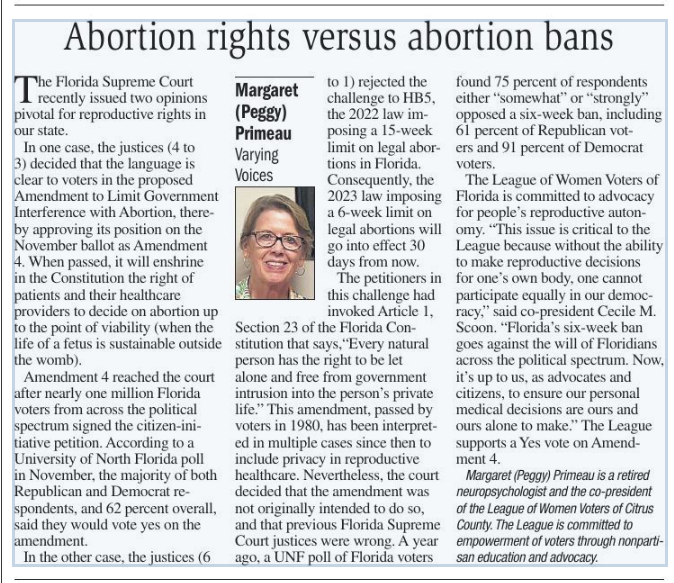
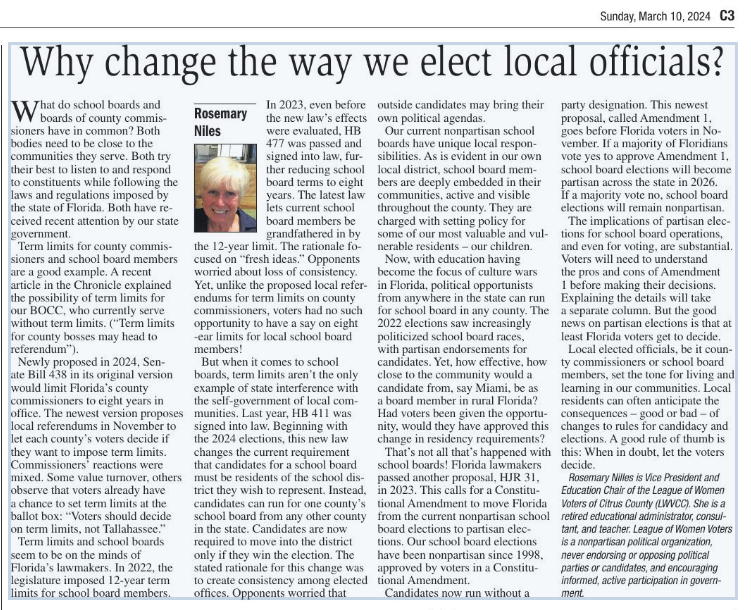
Rosemary’s article above was published on March 10, 2024
Rosemary’s article below was published on January 20, 2024
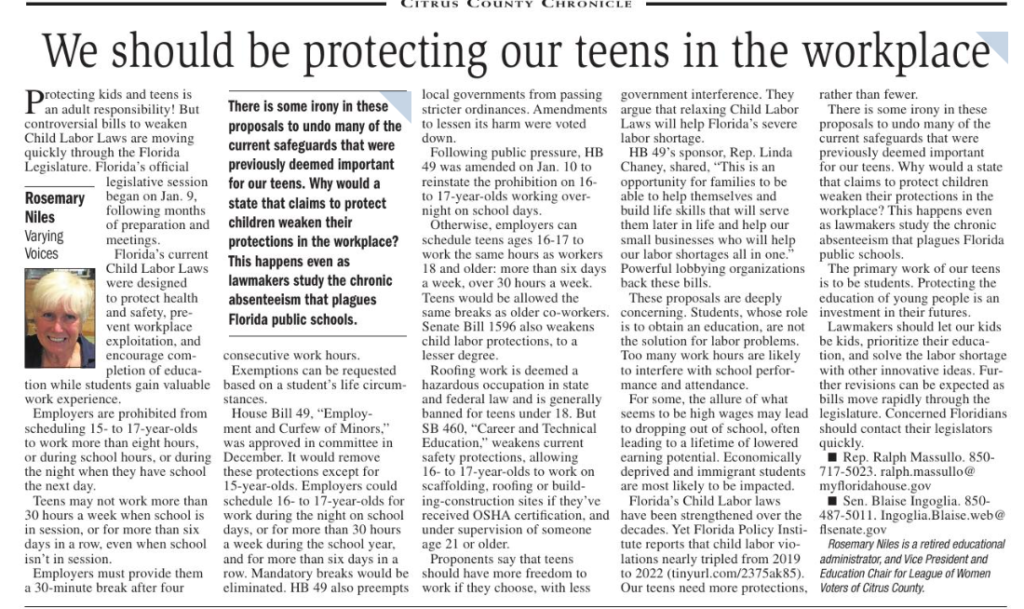
Unrealistic Expectations
I plead guilty of having unrealistic expectations for my country, the States of America (we are absolutely not united), and my chosen state, Florida.
I expect the following:
That when one uses the word freedom that it means freedom for all, not just for those who go to their church, live in their community, look like them, behave in a way others tell them to act, or read the books, listen to the music, or watch the movies they say they should watch.
Our elected officials are our public servants, not our power grabbers who legislate restrictive laws which persecute selected groups of people. Children should be educated in a free education system where the truth is not hidden. They should not be taught to be quiet and be afraid of the people who are supposed to be helping them to grow up and be who they were meant to be, happy, functional adults who can think for themselves.
That people treat each other with respect, dignity, and compassion. I expect them to enact common sense laws that protect all the people, not just the privileged or powerful.
That people should be careful with their language so that they don’t purposefully target groups or individuals to hurt them.
I believe that we can no longer afford to be part of a passive democracy. We need to first of all be aware. The truth is there if we open our eyes and ears and use our common sense to see it.
We need to participate in government by not being afraid to express our views and discuss issues.
Most importantly we need to express our sacred right to vote by making an intelligent decision based on the truth and the real self-interest of the voter, not what others manipulate them into believing.
Vicky Iozzia, Beverly Hills
Published in the Citrus County Chronicle February 19, 2024
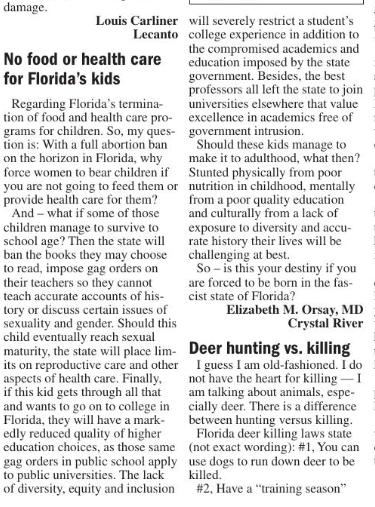
Elisabeth’s article was published on January 11, 2024.
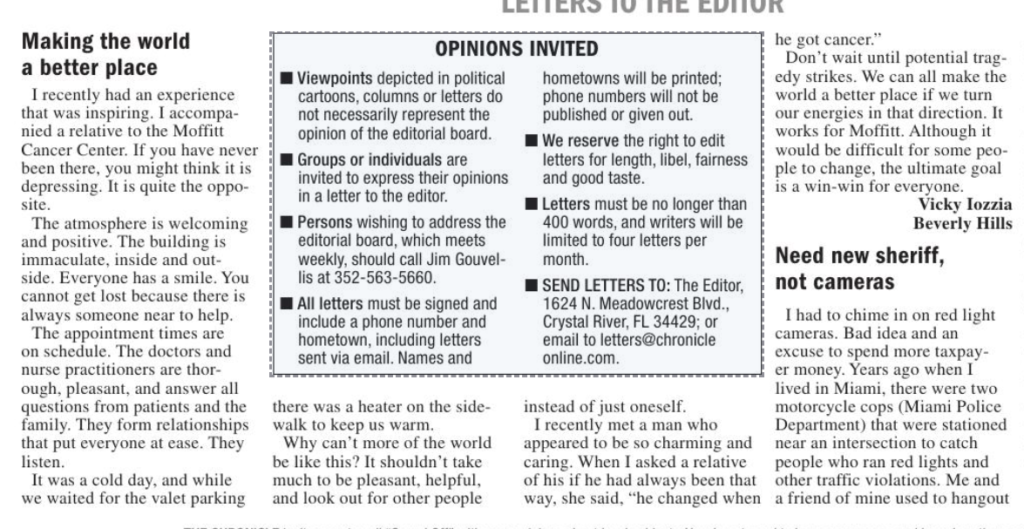
Vicky’s article was published on January 10, 2024
Good column on gun safety
In his column, “Ensuring a safe winter break: A guide for parents and children” (Dec. 17), Lt. Scott Farmer of the Citrus County Sheriff’s Office cautions parents about home safety. His straightforward advice on talking to kids about firearms and keeping them locked is especially welcome in this era of increased gun violence. For two years in a row, firearms have surpassed vehicles as the primary cause of death in kids 18 and under.
Keeping kids safe is an adult responsibility! Unintentional shootings by kids continue to rise. Florida’s unintentional shootings grew from 22 in 2020, to 24 in 2021, to 29 in 2022, and already 29 in 2023! Nearly half of these shootings result in death, the others in injury. All cause ripples of trauma. (Data from Everytownresearch.org.) A Florida family fleeing from Hurricane Idalia last September lost one of their sons when his brother found and discharged an unsecured gun in their hotel room. Toddler and teen boys are most frequently involved, most often during holidays, weekends, and summer vacation.
We don’t call unintentional shootings accidents because they are entirely preventable. But they’re only part of a bigger problem. Teen suicide by gun increases annually. And about 75% of teenage school shooters got their weapons from home or that of a close relative.
Talking to kids about guns is a precaution, not a guarantee of safety. As Lt. Farmer states, keeping firearms locked and separated from ammunition is essential anywhere that kids are present. Parents should also ask about the presence of guns in other homes – just as we ask about dogs, pools, and other safety issues. Such conversations have become more normalized, especially when handled via text message. And keep in mind that guns in vehicles must also be secured, with stolen guns often used in crimes.
League of Women Voters of Citrus County, along with Moms Demand Action for Gun Sense, actively promotes this non-controversial, non-political message across Citrus, using the Be SMART message. (https://besmartforkids.org). Be SMART helps parents and adults normalize conversations about gun safety and take responsible actions that can prevent child gun deaths and injuries. We share information and cable locks with agencies, churches, community groups, and at health and safety fairs. We are proud to continue to work with law enforcement in Citrus to spread this life-saving message.
Rosemary Nilles
League of Women Voters of Citrus County
Rosemary’s article was published on December 31, 2023
What do clean water, marijuana, and abortion rights have in common?
Did you know that voters in Florida have a superpower? They can directly propose amendments to the Florida Constitution that will appear on the ballot for all voters to have a say. Only 15 other states allow this process. It’s called a direct citizen initiative.
Why would voters want to amend the Constitution? We might want to establish a more permanent right than a single statute would. We might want to address issues that legislators have avoided. We might want to change laws that do not reflect the wishes of the people.
How does a proposal make it to the ballot in 2024? According to the office of the Florida Department of State Division of Elections: “In order to get a proposed amendment by initiative on the 2024 General Election ballot, a petition must be signed by 891,523 voters and the signatures must come from a number of electors in each of one half of the congressional districts of the state, and of the state as a whole, equal to eight percent of the votes cast in each of such districts respectively and in the state as a whole in the last preceding election in which presidential electors were chosen.”
Translation: To appear on the ballot requires validated petitions from at least 8 percent of 2020 Florida voters, to include 8 percent from at least 14 of our 28 Congressional Districts, all certified by Feb. 1, 2024. Practically speaking, petition-gathering needs to wrap up this month.
If your brain is not too full, you can find more information about the petition process on dos.fl.gov. On the “Initiatives” page, you can read the full text of a proposed amendment, see the sponsoring organization, and track the petition validation numbers from county Supervisors of Elections who verify the eligibility of every signer. The Citrus SOE (votecitrus.gov) posts monthly reports on petitions as well. The amendments must also undergo financial-impact analysis and pass judicial review by the Florida Supreme Court on clarity of language.
You may be aware of current petition-collection for amendments on the Right to Clean and Healthy Waters (validated petitions as of Dec. 8: 88,685), Adult Personal Use of Marijuana (1,033,769), and Limit Government Interference with Abortion (687,700). The Clean Water amendment – which gives legal leverage to citizens for enforcing existing laws – will not reach the threshold in time and will start over for 2026. The Marijuana amendment – which allows adult recreational use – has met numeric criteria. The Abortion amendment – which legalizes abortion up to viability – is predicted to meet criteria. Both amendments await judicial review.
These two initiatives have significant bipartisan support. According to the November poll from UNF’s Public Opinion Research Lab, 62 percent of voters (77 percent of Democrats, 53 percent of Republicans) would vote “yes” on the Abortion amendment, and 67 percent (78 percent of Democrats, 55 percent of Republicans) would vote “yes” on the Marijuana amendment.
Is a citizen initiative a lot of work and expense? Yes. The sponsoring organization pays for creating and printing the petitions, and for the SOE fees for verification. The Marijuana amendment, for instance, is reported to have raised about $40 million. Campaigns rely on paid petition-gatherers as well as volunteers.
Where do you get petitions? Follow the link for the sponsoring organization on the dos.fl.gov “Initiatives” webpage. Or just Google “2024 FL amendment on (topic).”
Do you have to be a registered voter in Florida to sign a petition? Yes. In fact, a petition can serve to “reactivate” your status if you haven’t voted lately – just check the box.
Does signing a petition commit you to a “yes” vote on the issue? No, but that is the point of the initiative. Put it before the voters and let them decide!
How many votes will be needed to pass an amendment in 2024 and change the Florida Constitution? At least 60 percent of the votes cast.
To use your superpower, sign a petition now and, most importantly, VOTE in November 2024.
Margaret (Peggy) Primeau is a retired neuropsychologist and the Secretary of the League of Women Voters of Citrus County. The League is committed to the empowerment of voters through nonpartisan education and advocacy. Find us on lwvcitrus.org and on Facebook.
This “Sound Off” on Peg’s article above was published on December 24, 2023
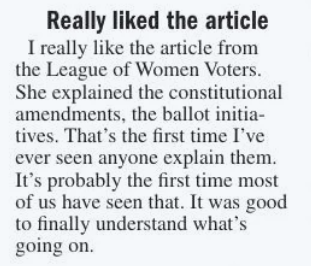

Vicky’s article was published on January 29, 2024
RESPONSE TO COLUMN ON TEACHER SHORTAGE
Lindsey Burke’s column, “The Phantom Teacher Shortage” (Nov. 24), demands a response – late or not.
Ms. Burke, speaking for the Heritage Foundation, denies teacher shortages. At the same time, she disparages teacher unions as the cause for increased numbers of non-instructional employees. She neglects to mention that mandates such as the Education of All Handicapped Students (now Every Student Succeeds Act), No Child Left Behind Act, class size limits, STEM and Career Technical Education initiatives, etc., all require professional personnel and para-educators to meet student needs and to offer a wide array of learning paths.
Ms. Burke’s contempt for public school staff seems only surpassed by her hatred for teacher preparation colleges. She suggests that states who have teacher shortages should eliminate “useless teacher certification requirements – which has the added bonus of weakening the grip of colleges of education on the teacher pipeline – and instead insisting on subject matter expertise.” Just because you have expertise does not make you a teacher.
She must not understand that teaching is not just telling. Nor is it assigning. Good teachers understand the various stages of learning, from acquisition to generalization, and tailor their instruction for each stage. They are prepared to use multiple methods of progress monitoring. They understand that instruction and assessment are deeply intertwined. Teachers must differentiate their instruction to address student needs. They develop accommodations to ensure that every learner remains actively engaged and successful, and provide various ways for students to demonstrate their learning.
Florida does indeed have a teacher shortage, beginning the school year with thousands of professional vacancies. We are the 48th state for teacher pay. Too many have left, leaving unqualified substitutes staffing classrooms across Florida. A recent column by a substitute teacher in Broward County illustrates this issue. https://tinyurl.com/42zxfcs4.
Attacking teacher unions and eliminating certification requirements are not the answers. Instead, Florida needs to create a supportive environment where our teachers are valued for their skills and paid for the professional expertise and caring that they bring to work each day.
Rosemary Nilles
Inverness
Rosemary’s article was published on December 19, 2023
The League of Women Voters made up of good people
The League of Women Voters is made up of people who have a love of democracy and government. They are not political virgins but have spent their lives belonging to one or more political parties over the years, which is a history we expect of anyone in a political organization. Normally when a religious person wants to serve God in a religious organization, they are not atheist’s. Just so, those that join the League have a personal belief system and will generally belong to a political party. If they didn’t, how could they vote and try to encourage others to do so?
League members are not absent political leanings. How can you serve in a political organization and have no political history, ideas or ability to recognize issues of concern when they occur. They are not nuns who give up all of their personal history and memories. They are fervent in their beliefs so much so they they spend hours in volunteer work. While they may not shed their political leanings, they try to function in a way that does not influence others when they are trying to register people to vote. This is not easy, but when representing the league they do their best to be neutral and not influence others to their way of thinking. When they are not wearing the league robes, they have the legal and ethical right to believe anything they like just like everyone else does and to speak their mind. They don’t bury their ideas.
The early suffragettes spoke up publicly demanding their right to vote. They went to prison for their speech because others feared the power women would have if they received the vote. Just so, the modern League of Women’s Voters are not partisan publicly but they are political. They fight for non-partisan issues such as equality, reproductive health and justice, environmental health, educational freedom, poverty, human rights and other issues. These are universal goals and do not represent a political party.
Please recognize members of the League of Women Voters as intelligent, interesting and motivated individuals who care a great deal about where current events are leading us. They want others to recognize the power of the vote and to engage politically in shaping political events. You can’t be absent ideas to engage in this effort.
Nancy Tomaselli
Hernando
Nancy’s article was published on September 4, 2023
Still fighting to register voters in Florida
Across our spacious skies, amber waves of grain, and the purple mountain majesties of our great but struggling nation, many people and organizations are working to extend the fundamental right to vote to all lawful citizens. Special plans for expanding the foundational right to vote to all lawful citizens are being made for National Voter Registration Day on September 19. In the face of efforts to expand the franchise, there are a number of states focused on making it harder for citizens to vote and adding difficulty to registering voters, including here in Florida.
In a 2021 ruling, Chief U.S. District Judge Mark E. Walker found that Florida officials have spent the past 20 years intentionally making registering voters and voting more difficult by creating a variety of prohibitions erroneously. Since Judge Walker’s order, the Florida Legislature has “gifted” Floridians with yet another nearly 100-page law with a slew of even more prohibitions, increased criminal penalties, and fines related to voting. This new government “fix,” also known as Senate Bill 7050, directly impacts any organization that wishes to register voters in Florida.
The League of Women Voters, a more than a century-old nonpartisan organization, whose volunteer members are dedicated to registering and educating voters, has made the difficult decision to change its way of doing business in Florida due to this newly enacted law. Dedicated volunteers will no longer collect completed paper voter registration forms and return them to their local Supervisor of Elections on a voter’s behalf. Gone are the days when hundreds of skilled volunteers with paper registration forms, pens, and clipboards will register voters in neighborhoods and at community events. Senate Bill 7050 sets fines for even inadvertent errors so high, the League’s yearly budget could be affected.
Fines for turning in voter registration applications late have also risen drastically, while the time allotted to turn in the applications has been shortened from two weeks to 10 days. Coupled with this, if a person wants to mail their voter registration form in, they run a risk that the application will not be received in time to vote because the United States Postal Service is no longer trusted to deliver mail in a timely fashion.
Despite the continued efforts to make registering voters more difficult and perilous, the League of Women Voters of Florida believes every lawfully eligible citizen should have the right to vote. The League is committed to continuing to provide Florida’s citizens with expert voter registration assistance and nonpartisan education for all voters. To protect the organization from the harmful provisions of Senate Bill 7050, the League has purchased laptops, tablets, internet hotspots, and internet subscriptions to assist citizens in using Florida’s online voter registration process. Instead of registering several voters at once, as possible with paper forms, the League is now limited by the number of devices it can afford to have on hand. Citizens who are not able to use the internet form will be provided a blank voter registration application, an envelope, the requisite Supervisor of Elections address, and a stamp. Sadly, due to the new provisions, League members cannot even place sealed envelopes with completed forms in the mail on behalf of registrants.
“If it ain’t broke, don’t fix it” is a saying we grew up with here in the South. This is especially true when applied to government actions. After the 2022 midterm election, Gov. DeSantis declared, “The way Florida did it, I think, inspires confidence. I think that’s how elections should be run. We’re now being looked at as the state that did it right, and the state that these other states should emulate.” The governor and the secretary of state were proud to proclaim all states should follow Florida’s lead in election laws and processing. Instead, we soon learned there would be additional unnecessary restrictions and penalties imposed. Fixing something that “ain’t broke” is exactly what the Florida Legislature and the governor did when enacting Senate Bill 7050.
Nevertheless, the League of Women Voters is strong and its dedicated members are unyielding. Regardless of the unnecessary roadblocks erected, the League will continue to empower voters and defend democracy. Although the system wasn’t broken and the government’s “fix” just made things a whole lot worse, the League will continue to assist citizens in registering to vote in the same professional, experienced, and qualified manner just a lot less efficiently and with a significant increase in cost.
Cecile M. Scoon, Esq., and Debbie Chandler, Esq., serve as co-presidents of the League of Women Voters of Florida. The League of Women Voters of Florida is a nonpartisan political organization encouraging informed and active participation in government, working to increase understanding of major policy issues, and advocating for legislative changes and policies for the public good.
Cecile and Debbie’s article was published on September 17, 2023
LGBTQ kids deserve better
Who can forget their teen years, when most of us longed for acceptance and belonging? Imagine being a teen who is targeted by politicians with new laws every year, laws that ostracize or devalue them.
How would it feel to be part of a group whose members are not accepted for who they are?
How must it feel to be a LGBTQ teen in Florida?Schools should be places where kids feel safe and valued. But Florida’s new laws have targeted LGBTQ kids in public schools. Although teachers don’t teach about gender identity or sexual preference anyhow, they face punishment if they are accused of teaching these topics. Another new law forbids teachers to use their students’ preferred pronouns. How would it feel to be a student whose very identity is considered to be unmentionable? And no, they weren’t “groomed” by their teachers as some accuse.
LGBTQ kids are also targeted indirectly by another new law requiring that all materials in public school libraries or classrooms be reviewed for objectionable content. Parents and citizens may challenge materials they find objectionable. Numerous books have been permanently removed from schools across Florida because they may contain content about sexual identity. If LGBTQ kids seek affirmation or resources, will helpful books even be available?
In Florida, LGBTQ kids and their parents are now second-class citizens. Parents and even physicians are forbidden to provide gender-affirming care to kids and teens. Most of these kids and their parents have known for several years about their gender identity. But the government of Florida has declared itself to know their needs better than their parents and physicians.
Communities should recognize the worth and value of their citizens. But LGBTQ individuals are the target of cruel and demeaning language from politicians and community members. LGBTQ kids are given labels like “sociopaths” and “deviant.” Kids hear that they have been “indoctrinated” by “groomers” or “pedophiles.” What a hurtful atmosphere for anyone to grow up in!
Some may claim to not understand what makes LGBTQ kids who they are. Most of us have never walked in their shoes. It should not matter! Every LGBTQ youth is somebody’s child. All are children of God. They deserve better.
Rosemary Nilles
Inverness
Rosemary’s article was published on May 18, 2023
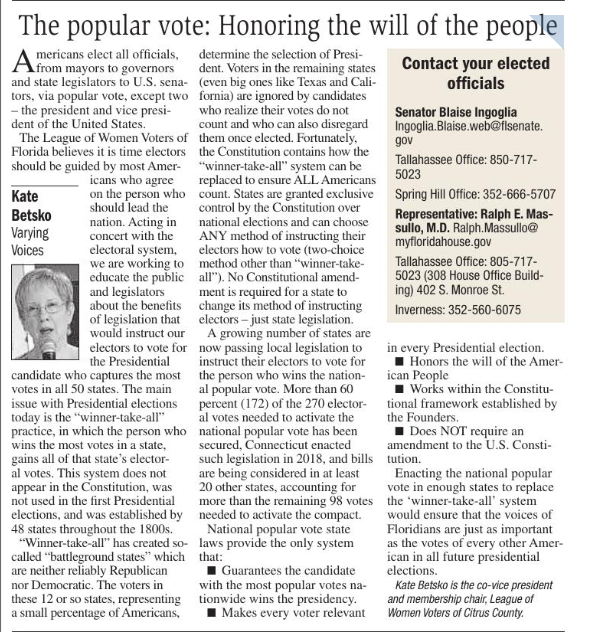
Kate’s article was published on April 23, 2023
Making “choices” wisely
A few weeks ago, my column, Understanding the Impact of School Choice Bills, was printed in the Chronicle. Despite fiscal concerns and opposition from many groups, the Florida House has passed HB 7, which will offer vouchers of approximately $8,000 to any Florida student.
My column pointed out some of the issues that arise when public funds are used to finance private or home schooling. These include unregulated curriculum and teacher quality, discrimination in admission policies, lack of financial oversight, and lack of public information about student outcomes.
The cost of these vouchers is estimated to be $4 billion in the first year alone (Florida Policy Institute). The vouchers will take money directly from public school funds. Yet our neighborhood schools are already underfunded. Florida ranks 48th in public education funding. Our teachers are underpaid, and we face a crippling teacher shortage.
Data from Florida’s Department of Education shows that in Citrus County, Family Empowerment Scholarships are already taking $6.0 million, or 8.2%, of state funding, directly from the district budget for the current school year! More vouchers will only increase these amounts.
I will repeat the suggestions made in my recent column:
“If passage is inevitable, legislators must amend the bills to build in uniformity, equity, and quality so that all schools receiving public monies meet Constitutional requirements. Lawmakers must allocate adequate funds to ensure that public schools remain strong and effective. Parents would need full transparency to make informed choices for their children.”
The issue is not “school choice.” Parents have a right to make choices for their children. But choices need to be offered wisely, fairly, and transparently.
Rosemary Nilles
Rosemary’s article was published on March 26, 2023
Inverness
Understanding the impact of school choice bills
New School Choice bills that will dramatically change the nature of public and private education in Florida are advancing through the House and Senate. HB 1 and SB 202 would create a “universal voucher system” that expands current scholarship programs.
The new laws would make all students in Florida eligible for Education Savings Accounts (ESAs). Eligibility would expand to every K-12 student, regardless of income or whether they are already in a private school or are being home-schooled. These funds, nearly $8,000 per student, could be used for tuition or other educational expenses.In the name of parental choice, the dramatic expansion of vouchers could potentially undermine Florida’s system of public education. Further, moving to a system of “vouchers for all” raises issues of quality, equity, and overall constitutionality.
Florida’s Constitution, Article IX, is clear on the value of education: “Adequate provision shall be made by law for a uniform, efficient, safe, secure, and high-quality system of free public schools that allows students to obtain a high-quality education.”
This column will briefly discuss the impacts of HB 1/SB 202 as they relate to private education, focusing on quality and equality; fiscal issues and impact on public schools; and overall constitutionality.
How do private schools differ from public schools in issues of quality and equality?
Florida Department of Education (FLDOE) reports that more than 85 percent of Florida families choose to send their students to public schools. About 13 percent attend private schools.
Public schools in Florida must follow a curriculum based on high academic state standards. Private schools have no requirements for curriculum or standards. They are free to teach what they wish, whether or not supported by research.
While public schools have traditionally required teachers to be certified in their content areas, private schools have no requirements for teacher certification.
In public schools, student achievement is regularly assessed based on state standards. Schools are graded based on student performance and school results are made public. Private schools have minimal assessment requirements and results are not publicly reported, making it difficult to judge effectiveness.
The overall quality of private schools varies greatly. Financial instability and limited budgets and facilities may impact educational experiences, e.g., sports, music, theater.
Public schools must accept and educate every student, regardless of special needs. Private schools can be selective of their students and turn away students based on factors such as behavior, religion, sexual orientation, or gender identity. They have more “choices” than parents.
Public schools are overseen by FLDOE and nonpartisan, locally elected school boards. Private schools are governed by private or religious groups. 56 percent are religious, and 31 percent are for-profit. FLDOE has no jurisdiction over private schools and provides only minimal oversight for attendance, health, and safety. https://www.fldoe.org/schools/school-choice/private-schools
The differences are stark. Yet Florida’s Constitution requires a “uniform, efficient, safe, secure, and high-quality system of free public schools that allows students to obtain a high-quality education.” Without information about every aspect of each private school, parents risk making uninformed choices and lost learning time for their children.
What are the fiscal impacts of a universal voucher system in Florida?
School vouchers are already funded by Florida taxpayers, directly or indirectly. Family Empowerment Scholarships, established in 2019, divert funds directly from school district per-pupil allocation. The per-pupil amount for each student leaves the district and goes towards the private school.
As the number of scholarships rises the cost of funding them also rises. In 2022-23, about 10 percent of total state aid for public education went to scholarships. In addition, about $1.1 billion in public dollars is diverted from the state treasury through Tax Credit Scholarships financed by corporate tax credits. https://tinyurl.com/yx74hz6r.
Scholarships are currently administered through nonprofit Scholarship Funding Organizations (SFOs) and paid directly to private schools for tuition. The new legislation would change scholarships to Educational Savings Accounts (ESA). ESAs are similar to debit cards that can be used for tuition or other education-related expenses like tutoring, after-school programs, or materials. ESAs will divert taxpayer money directly to individuals, bringing concerns of oversight and transparency.
Analysis by the Florida Policy Institute (FPI) indicates that the cost of these vouchers will likely increase to $4 billion in the first year alone. That would require an extra $2 billion next year to cover the cost of students already in private schools and homeschooled students. https://tinyurl.com/85e25dba.
How will universal vouchers impact public schools in Florida?
From the FPI: “If the state does not increase revenue … then the reallocation of state aid to cover vouchers will leave school districts with significantly less revenue to fund the remaining public school students.”
Public education in Florida is currently underfunded by $4,000 per student as compared to the national average. Florida ranks 44th in public education funding, with funding level rated “F.” https://tinyurl.com/vctnrvbh. Teacher pay is among the lowest in the nation, and Florida faces a significant teacher shortage.
Without additional funding for public education, the increased costs of vouchers could rapidly deplete public school funds, resulting in larger class sizes and fewer resources and programs. Yet a Constitutional Amendment to limit class size was approved in 2002.
Voucher amounts will not pay the full cost of tuition at more costly private schools. Some families may have to choose “lesser” private schools. When tuition rises, lower-income families may not be able to afford those schools, returning their children to public schools. Once again, uniformity, quality, and equity of public education are at stake.
Public education is a cornerstone of a democratic society. Our system of free public education operates from the belief in equal opportunity for short-term and long-term benefits – to the individual and to society.
HB 1 and SB 202, with their potential to weaken our public education system, stand in direct opposition to our Florida Constitutional mandate for a “uniform, equitable, efficient high-quality free public education system.”
If passage is inevitable, legislators must amend the bills to build in uniformity, equity, and quality so that all schools receiving public monies meet Constitutional requirements. Lawmakers must allocate adequate funds to ensure that public schools remain strong and effective. Parents would need full transparency to make informed choices for their children.
Both bills have already been approved in pre-session committees in the House and Senate. With the 2023 Florida Legislative session beginning on March 7, they are moving quickly toward floor votes. Citizens may contact state legislators with opinions on these and other bills:
Rep Ralph Massullo District 23, 850-717-5023, Ralph.Massullo@myfloridahouse.gov
Senator Blaise Ingoglia District 11, 850-487-5011, Ingoglia.Blaise.web@flsenate.gov
Rosemary Nilles is a Board Member and Education Chair of the League of Women Voters of Citrus County (LWVCC). She is a retired educational administrator, consultant, and teacher.
League of Women Voters is a nonpartisan political organization, never endorsing or opposing political parties or candidates, and encouraging informed, active participation in government.
Rosemary’s article was published on March 4, 2023
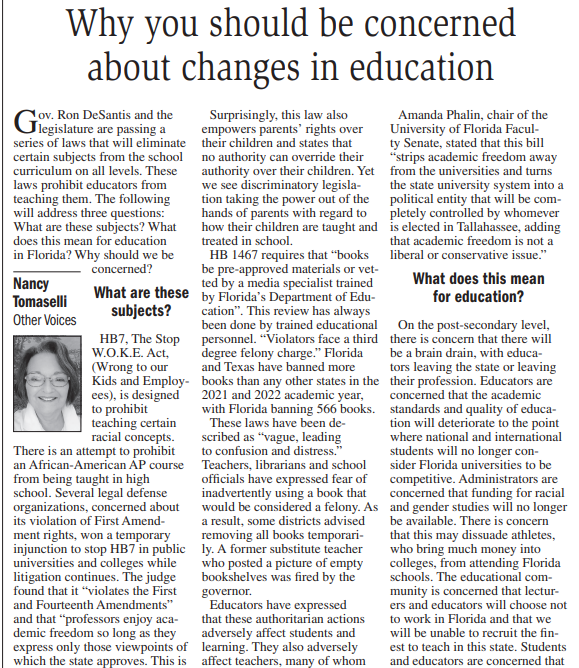
with classes being diluted by the whims of politicians, graduating students will be unprepared to succeed in bettering their lives.
On a K-12 level, children are deeply sensitive to their social experiences in school and susceptible to their environment. There is concern that minority children and those of the LGBTQ community will feel oppressed and singled out. Their emotional needs may be ignored because of fear that any conversation may be considered a felony.
Why should we be concerned?
We need to educate children about all of the information they need to prepare them for the challenges life brings. We fail our children if we do not give them the tools they need to succeed in life. These are the tools of knowledge and self-knowledge as well as understanding of the “other.”
With a sleight of hand, we are being told that we are having freedom restored while a progressive and significant violation of our First Amendment rights is quietly being implemented in our public education system.
The irony is that the education they are removing is the key to undoing generational prejudice.
Nancy Tomaselli is the co-president of the League of Women Voters, Citrus County.
Nancy’s article was published in March 12, 2023
Other Voices: Safe storage saves lives
We love our little ones. We strap them into car seats, choose childcare providers carefully, and get them vaccinations to keep them healthy. Yet, between 2015 and 2021, at least 610 American toddlers and preschoolers managed to find a gun and unintentionally shoot themselves or someone else, often siblings or playmates.
We love our kids. We monitor their screen usage, guide their choice of reading materials, avoid letting them eat too much junk food. But about once a day in the U.S., curious kids and teens find and discharge guns, ending in death nearly half the time.
We love our teens. We set curfews, watch who they hang out with, and limit who they can ride with. And yet, each year nearly 700 American kids and teens end their lives with a gun.
It doesn’t make sense. For a nation which loves its children, we are failing to keep them safe. An estimated 4.6 million children live in homes with at least one unlocked, unsecured gun. Last year in Florida, there were 24 incidents of preventable shootings by children. Such incidents can and do happen in Citrus County. (Data references are from everytownresearch.org.)
Even worse, guns are now the primary cause of death for American children under eighteen. Hundreds of other children are injured by guns, and thousands witness the deaths of people they love. Each death or injury creates ripples of long-term grief and trauma.
It doesn’t have to be this way. Keeping kids safe is an adult responsibility!
Talking to kids about guns is a precaution, not a guarantee of safety. Children are just too impulsive.
Gun owners can make their homes and communities safer by storing their guns securely.
Florida law requires loaded firearms to be secured from a child’s access. That means being in a locked box, container, or secured by a gun lock. But it’s far safer to store guns locked and unloaded, and ideally, separated from ammunition.
Secure storage also applies to vehicles. Keeping a loaded gun under the car seat or in a glove box is risky and dangerous. Just as we lock up other valuables, guns should be locked and secured, wherever they are.
How can safe firearm storage prevent unintentional shootings and suicide?
Suicide: For kids and teens, the decision to commit suicide is often an impulsive one. Quick access to a loaded gun makes it easier for anyone to end their life. Over 80 percent of child suicides involve a gun owned by a family member. Suicide by gun is far more effective than other methods – with an 85 percent fatality rate. Secure storage also benefits older adults and veterans who may be experiencing risk factors for suicide.
School shootings: Did you know that 78 percent of school shooters under age 17 obtained their firearms from their own homes or a friend’s home? How much safer would all of our children be if potential shooters couldn’t access a gun?
Asking: We should also ask about guns in homes our children visit. Even when we practice responsible storage, children and teens find unsecured guns in other homes.
Stolen guns: Keeping our firearms locked and unloaded would help to prevent the staggering numbers of gun thefts each year. Most are stolen from private owners, with about 25 percent taken from vehicles! Stolen guns frequently end up in underground markets, where criminals can easily obtain firearms without restriction.
Doesn’t safe storage defeat the purpose of having a gun?
It’s a myth that storage devices defeat the purpose of owning a gun by putting barriers between the gun owner and their means of defense. There are many affordable options for gun storage that provide quick access to guns, while still preventing access by children, or those at risk of harming themselves or others.
These options include inexpensive cable locks, trigger locks, lock boxes (many with biometric locks), vehicle safes, and gun cabinets.
“Smart” firearms use technology for authorized use only, such as a fingerprint, thumb scan or passcode. If stolen or accessed by children, smart guns are harmless. Using smart guns could be a game-changer for keeping guns out of the hands of kids and criminals. Yet now, only three states require them.
It’s our right as Americans to have firearms, but with rights come responsibilities. We can’t prevent every death or injury, but safe storage saves lives.
Simple behaviors – keeping guns locked and unloaded – could make the difference between life and death, safety or injury, for our own children or someone else’s.
Would your local organization or church like to promote the message of safe storage in our community? For more information, please contact League of Women Voters of Citrus County (LWVCC) at lwvcc2013@gmail.com. or Moms Demand Action for Gun Sense – Citrus at citrusmoms7@gmail.com.
We love our children. Let’s work together to keep them safe.
Rosemary Nilles is a retired educator and administrator. She is a board member of League of Women Voters of Citrus and LWV Florida’s Gun Safety Action Team. She is also a volunteer leader with Moms Demand Action for Gun Sense – Citrus.
Nancy’s article was published on December 4, 2022
